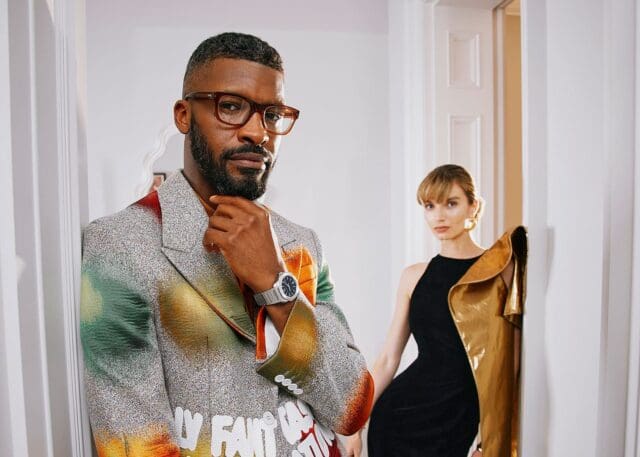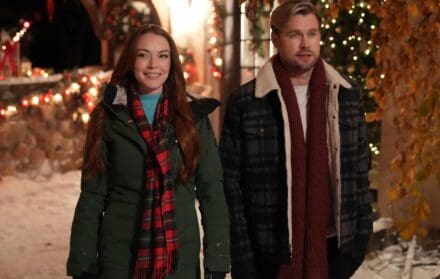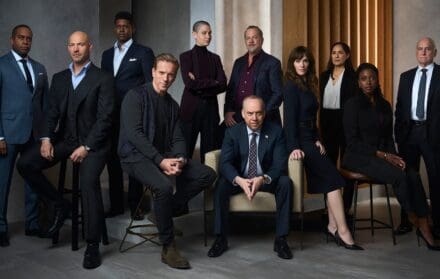
Rosamund Pike on Becoming War Correspondent Marie Colvin
“For me 30 is the decade to be in. It’s where I can get the richest roles, but have a family as well.”

In recent years, Rosamund Pike has developed somewhat of a penchant for playing historical figures. In 2016, there was her turn as Ruth Williams Khama, wife of the first President of Botswana, in A United Kingdom. Following this, the past 18 months have seen Pike portray SS officer Reinhard Heydrich’s wife Lina, and then German left-wing militant Brigitte Kuhlmann in The Man with the Iron Heart and Entebbe respectively.
These individuals appear to be far removed from Pike’s own idiosyncratic English upbringing, which saw her win badminton scholarships in her youth and go on to study English Literature at Oxford. But the Hammersmith-born actor’s childhood was one of decided European sentimentalities too, as she travelled the continent with her opera-singing parents in “a sort of gypsy life”, and learned to speak French and German in her spare time.
These linguistic attributes would of course come in handy when it came to filming The Man with the Iron Heart and Entebbe in particular, but Pike’s next project poses a further challenge. In the upcoming biopic, A Private War, Pike is set to eschew the past in favour of a far more contemporary source of inspiration, celebrated war correspondent Marie Colvin, who was killed in Syria six years ago.

“Because I was playing someone who has lived and whose memory is so recent, I took it on as a responsibility to be as much like her as I could,” the 39-year-old explains. “I studied everything about her physicality as much as I possibly could for months, the little gestures, the tiny details. Sometimes the big things – how she walked, how she sat, how she ran – but also the smaller things.
“I also knew we had to tread very delicately on the memory of Marie and earn the trust of the people who knew her because not only was their loss so recent, her family and friends were going to be a great resource for me to learn more about her.”
Pike adds that she was lucky in one respect: that Colvin’s life was utterly captivating and seemingly ready-made for a silver screen adaptation. “She had balls,” Pike declares. “One of the key things about Marie was that not only was she one of the world’s top war correspondents who told the human story of people on the ground, but she also had access to the world’s leaders – she had Gaddafi’s ear, she had Arafat’s ear – she was trusted by these very difficult men in a way that few other journalists were. She was fearless in her tenacity. I felt that if we captured that fierce appetite for a story and keyed in her vulnerability and the cost of that fierce dedication, then we had done her story justice.”

Instantly recognisable by virtue of the eyepatch she wore after a Sri Lankan rocket-propelled grenade cost her the sight in her left eye in 2001, Colvin’s reputation as a fearless reporter led her into battlefields across the Middle East and beyond. The injuries she sustained in Sri Lanka may have left her hospitalised, permanently scarred, and suffering from post-traumatic stress disorder, but they failed in keeping her from submitting her 3,000 word article to The Sunday Times – on deadline.
And believably encapsualting Colvin’s all-action persona began as more than just a case of mental dedication and preparation for the usually statuesque Pike.
“Marie was ready for action and she carried a residual tension in her body that I don’t have,” she acknowledges. “I knew that she carried her shoulders in a different way owing to the weight of what she took on in the field, and being primed for an attack that could come at any point.
“I suppose I felt that I couldn’t get inside her mind unless I got inside her body – she had a very strong character in her whole body and I had to shed my own physicality as part of that process.
“I remember going for my medical before my next film and when the doctor measured my height it was a centimetre-and-a-half less than normal, simply because of the way I had allowed my body to change and adopt that same tension.”
Continuing in the recent rich vein of cinematic form that has earned her considerable plaudits over the past few years – including BAFTA, Golden Globe and Academy Awards nominations for her lead role in Gone Girl – Pike is next set to inhabit the world of legendary scientist Marie Curie in Radioactive, due for release next year. The portrayal of so many fascinating female characters of late poses an interesting juxtaposition to her big screen breakthrough as ‘Bond Girl’ Miranda Frost in Die Another Day But in spite of this apparent step-up to roles arguably more befitting of her talents, Pike insists that it’s the stories that captivate her attention above anything else.

“It’s really the script and director that determine my choices. I don’t particularly care whether it’s a big budget film or one that’s likely to be a hit at the box office; acting will always be my true passion.
“I like to go from costume movies to other genres, including television appearances and especially the theatre. If I had the choice between a great play and a blockbuster, I would much rather do the play. I love everything about the West End theatres, even the smell, behind the scenes, of trunks full of stage clothes.”
Such romanticism is indicative of Pike’s cultured background. With both her parents enjoying successful operatic careers – her father Julian now holds a prestigious position as professor of music and head of operatic studies at the Birmingham Conservatoire – there was a gamut of artistic pathways on offer to the Pikes’ only daughter.
“My parents never wanted to limit me in any way,” she says. “They simply wanted me to be happy in whatever profession allowed me to be creative and to express myself. They were a wonderful example for me in how they showed me it was possible to turn a passion into a career. They never pressured me to do anything else. I was encouraged to dedicate myself to what I loved and hopefully something I would be able to earn a living at.
“I studied literature at Oxford and I have beautiful memories of those years. I threw myself into the study of literature but also of music – I play cello and piano.”

It is a similar ideal she has planned for her own sons, the uniquely named Solo and Atom, with long-time partner Robie Uniacke, a businessman and mathematical researcher. “I would like to teach them music,” she agrees. “I was exposed to music from the age of three and a half, so I spent a lot of my childhood learning to play. But my parents have advised me to wait and not begin teaching them an instrument until they are older.”
Pike’s life, both privately and professionally she admits, has reached a welcome zenith: “For me 30 is the decade to be in. It’s where I can get the richest roles, but have a family as well.”
Inhabiting the war-torn world of Marie Colvin, however, allowed her to explore what life was like for not only war reporters but for the citizens living through wars and conflicts.
“Marie had an extreme level of empathy. She was able to go with people into their pain. She knew that her words would hit home – and they did.”
A Private War starring Rosamund Pike is in cinemas from November









